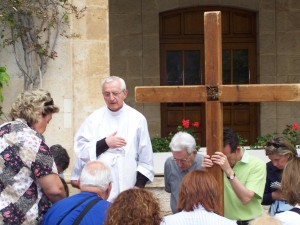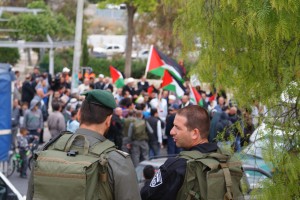Jerusalem: the city where peace lost its way
By Khaled Diab
Although Jerusalem is called the ‘House of Peace', its reality is that of conflict and dwindling hope. But can this divided city ever live up to its name?
Thursday 16 June 2011
There is something quite surreal about actually living in Jerusalem. It's not just the historical and spiritual backdrop, but there are also the conflicting realities of one's mundane domestic routines carried out in a bubble of relative tranquillity amid the wider context of tension caused by a rapidly changing geopolitical situation.

For instance, every morning my son, Iskander, and I walk through the old city to get to his crèche, where the Israeli soldiers with ridiculously oversized assault rifles slung over their shoulders have already become part of the ‘normal' background, except when they stop you to check your ID.
We pass within spitting distance of some of the holiest sites in Judaism, Christianity and Islam. And, for someone who lacks religious conviction, the city's catwalk of the assorted faithful – some of whom truly have their own crosses to bear while others are slaves to the bizarre fashion diktats of religion – is quite a sight to behold, especially when we arrived here around Easter/Passover time.
In Hebrew, Jerusalem (Yerushalayim) probably means House or Abode of Peace, rather like Dar el-Salam in Arabic. And although peace is quite literally on everyone's lips – Palestinians and Israelis meet and greet strangers and friends alike by saying salam/shalom (i.e. “peace”) – the hope that this wish will become a collective reality appears to be diminishing rather than growing.
Despite the apparent tranquillity of this medium-sized town of colourful diversity, tension and apprehension stir just below the surface. Held in a vice by settlements and walls, Palestinian East Jerusalem, now living in almost solitary confinement from the wider West Bank, feels like a dying civilisation under siege, especially when compared with that more vibrant and dynamic upstart, Ramallah, the Palestinian equivalent of Tel Aviv.
Even the apparently idyllic suburbia in which we live conceals the fact that it is on the front line of the battle for the soul of East Jerusalem. Although the area appears to be very Palestinian at first sight, there are four large Israeli settlements, as I learnt from my wife who researches such things, within easy reach, and we are a stone's throw away from a section of the Israeli separation wall.

When it comes to the Palestinians of Jerusalem, I sense that there is little optimism for the future, as demonstrated by the puny turnout to a Nakba day rally we encountered. This is perhaps unsurprising among people who feel like unwanted guests, even aliens, in their own hometown, which many have seen change beyond recognition in their own lifetimes.
Take our still-sharp and lucid neighbour who is nearly 90. She recalls fondly the years when her family lived in a mixed neighbourhood in what is now Jewish West Jerusalem, and counted Jews among their closest friends and best neighbours. Then, in 1948, the year her son was born, this world, along with their home, was lost forever.
Today, few Israelis and Palestinians interact on a personal level, whether in Jerusalem, where they live in close physical proximity, or elsewhere. This has led to a massive mutual distrust and dehumanisation in which the enormous diversity in world views, attitudes and beliefs on both sides are reduced to caricatures, stereotypes and simplistic generalisations.
Jerusalem's rapidly changing reality has left many Arab Jerusalemites with a sense of impending doom, the anticipation that their society stands on the edge of the abyss of oblivion. This, one Palestinian intellectual told me, has led many locals to abandon any hope for the future, after having held on desperately throughout the 1990s for peace and an independent homeland. A two-state solution has now become impossible, he concluded, and, with the Palestinians as the weaker party, a single state would result in them becoming “second- or even third-class citizens”.
Personally, I do not share this sense of pessimism. Though extremely difficult, a two-state solution is not beyond the bounds of possibility, with the right political leadership. As for a single, binational federation (my preferred option), with the right legal guarantees and a vibrant civil rights movement, it can truly become a state for all its citizens. After all, the Arab citizens of Israel show, despite recent setbacks, that relative equality is possible.
On the Israeli side, although a Jewish Jerusalem has largely been achieved and all that signifies spiritually and emotionally for millions of Jews, it is possibly only the settler movement that is truly rejoicing. Despite the official discourse of Israel having “no partner for peace”, many Israelis have awoken or are waking up to the realisation that they cannot have both settlements and a settlement to the conflict.
In fact, the settler movement has, in its bid to cement the Israeli grip on Jerusalem and much of the West Bank (Judea and Samaria), not only gone well beyond the call of duty to bulldoze the peace process by replacing the land-for-peace formula with a land-for-pieces one, but it has also alienated secular Israelis.
An Israeli newspaper editor told me that Jerusalem had seen a major exodus of Israeli liberals over the past two decades to Tel Aviv and other liberal towns, where they are able to keep their distance from the stifling influence of the Orthodox community and live in a comforting cocoon of normalcy in which they can ignore the conflict and even convince themselves that it is not going on.
This polarisation is visible in a multitude of apparently mundane phenomena. Take the controversial Tiv Ta'am supermarket chain – which has been at the centre of the ‘Kosher wars‘ for selling pork and staying open on the Shabbat when most of the country comes to a grinding halt – has no branches in Jerusalem.
The newspaper editor noted that the only liberals he still personally knew in Jerusalem were kept there by their work at the Hebrew University. Of course, there's also David Grossman.
We had dinner with a couple who belong to this ‘dying breed' of secular Jewish Jerusalemites, worldly university professors who presented a thoughtful and sensitive contrast – and one that is sadly not encountered regularly by the average Palestinian – to the mindless ideologues carrying the settler banner ever deeper into ‘enemy' territory, including inner city neighbourhoods of Jerusalem, such as Sheikh Jarrah.
Sadly, all the signs are that the Holy City will continue in its unholy role as the symbolic and actual focal point of the Israeli-Palestinian conflict for the foreseeable future. Nevertheless, although I doubt I will ever succumb to a secular version of the ‘Jerusalem syndrome‘, I refuse to succumb to despair and continue to hold out the hope and conviction that, one day, the right dynamics will fall into place for a just and lasting resolution. It happened in other longstanding and bitter conflicts, why can't it happen in the House of Peace?



A bi-national state in Israel-Palestine is not likely to succeed, because the two sides are following opposed concepts of nationhood. Israel is folowing an American-style “out of many, one” immigration model. Palestine is following a “one state for one people” model, like Serbia or Greece. In the latter model, “one people” means, same language and same religion (with some variants).
Demonization of West Bank Jews as “settlers” and “colonists” provides a fig-leaf for their dispossession. But what, exactly, is wrong with Jewish citizens in a Palestinian state? Note that Israel is not calling for the logical counter-move, the expulsion of all Arabs to Palestine. As things stand, if partition were effected today, Israel would be 20% Arab and Palestine would be 10% Jewish.
It would also help matters if Arabs were to concede 1)that escape to Palestine was a better option for the Jews than being murdered in Europe or Baghdad or Gondor, and 2)that Zionism has affected Palestinians in some ways that are good. But that will never happen.